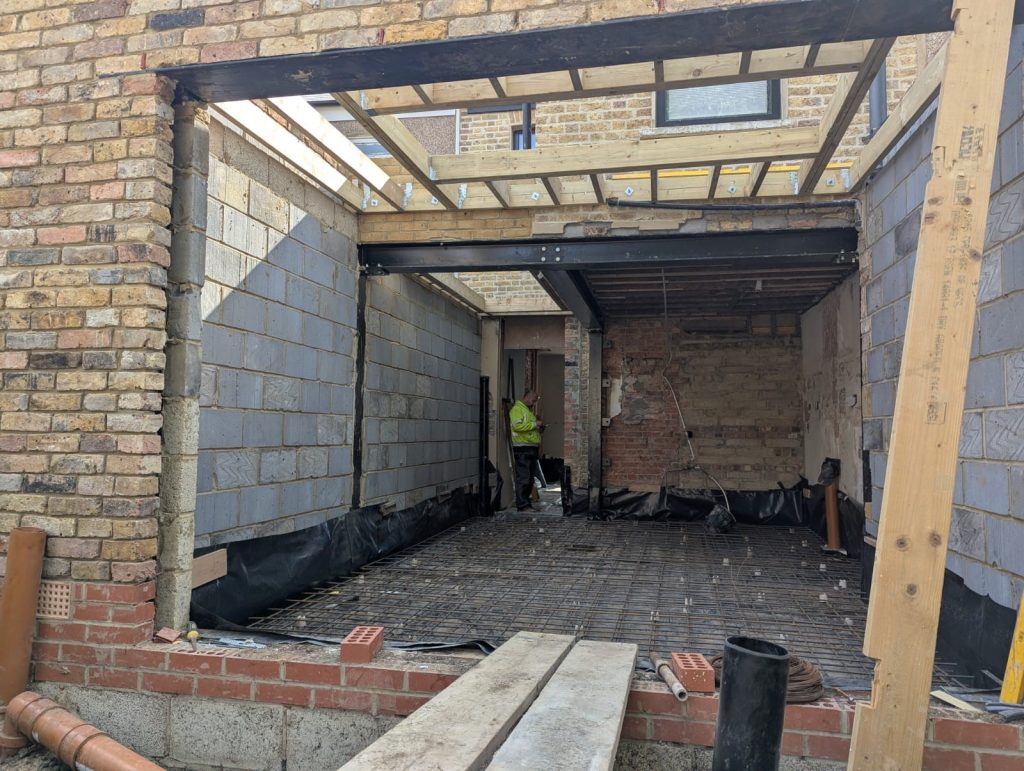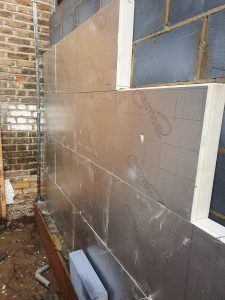Considering a home extension project poses a number of challenges shaped by rising material costs, stricter sustainability legislation and evolving standards for energy efficiency.
Whether you’re planning a full rear extension, loft conversion, or a beautiful garden studio, home renovation can be daunting- especially when you are just starting out. Regardless of scale, projects like these can be expensive, time-consuming and sometimes stressful, so thorough planning using the latest information and guidelines is essential.
Here are 10 things to consider before you start work.
1. Budget Realities in 2026

It is good to have a clear budget set for your home extension project as it will help you stay on track, saving you time and money – and stress. You will therefore need to gain a thorough understanding of the required costs – particularly in areas like design, professional services, materials and overall planning.
There are also several hidden costs that can often be overlooked, including waste removal, insurance, measured surveys, taxes, legal fees and material costs. There is also the all-important contingency budget – usually between 10- 20% of your build costs – that will cover any unexpected costs that inevitably arise.
Inflation and supply chain volatility continue to impact building costs. It is important that you do not rely on outdated figures but get a current 2026 one. Check that all prices are current and that you get a number of quotes from different reputable contractors.
It is important to note that material prices can increase mid-project. Ask your chosen builder about a fixed-price contract to protect you against any spikes in prices. Because of price fluctuations, this type of contract will prove invaluable.
It is well worth using digital budgeting tools like BuildScan, CostCertified, or HBXL to keep track of spending, quotes and contingency plans. For more tips on creating a budget and saving money on your build, read the architectural design phase and blog on how to get a realistic builder’s quote.
2. The Value an Extension Adds Today
Your home extension project should increase the value of your property. Take time to identify designs that offer substantial returns – either by consulting a local estate agent, an architect, or making your own research.
It is prudent to evaluate the real ROI (Return On Investment) of your proposed extension. Both Zoopla and Rightmove valuation calculators can help assess how much value your proposed extension might add.
According to Zoopla, loft and cellar conversions (for example) can increase your home’s value by 10- 15%. Additionally, investing in high-quality features like premium glazing not only adds timeless appeal but will also significantly improve your home’s energy efficiency – thus increasing its value. Properties with a higher EPC (Energy Performance Certificate) rating now command stronger prices and attract more interest from buyers and lenders.
Even if you are not planning on moving any time soon, it is important to view your project as a long-term investment for the future.
3. Energy Ratings Matter

Enhancing the energy efficiency of your extension is key to adding value to your home and also to reducing everyday living costs.
When planning your design and budget, it is important to consider the most energy-efficient and sustainable options. The Future Homes Standard is now in full effect in 2025, meaning that all new extensions must meet higher energy performance criteria. This includes better insulation, ventilation systems and heating technologies. Meeting these energy efficiency requirements is a key consideration for your budget as you need to balance the short-term costs with the long-term benefits.
Make sure you ‘design smart’. Even if you are not installing solar panels or a heat pump straight away, it is good to ensure your build is future-proofed for these upgrades. Another key factor to consider is your choice of glazing. Good quality glazing can significantly improve your home’s thermal performance – saving you money on your domestic bills.
Sustainability has become very important in 2026, and it is well worth considering targeting certifications like BREEAM or the Home Quality Mark to validate the environmental efforts of your extension and to increase long-term appeal.
4. Know Your Building Regulations
Building regulations are a set of safety standards that your property must comply with to ensure the well-being of its occupants. Major projects like house extensions, loft conversions and internal structural alterations must follow these rules. These regulations cover a wide range of standards, including hygiene, ventilation and electrical safety.
UK Building Regulations have evolved post-2023 to include tighter rules on fire safety, ventilation, and insulation. Ignoring them can cause costly delays or even legal issues.
It is advisable to consult a qualified building inspector early in the planning stage to ensure compliance from the start. Most UK councils now support digital platforms for building control documents – and this saves you time and paperwork.
5. Planning Permission Updates

Does your project require planning permission? Some extensions do not – particularly smaller outward or upward additions. Larger projects, on the other hand, will require planning permission. Extensions on certain types of property, such as listed buildings and buildings in a conservation area, also need planning permission.
For clarity, speak at an early stage with the planning department in your local borough council. There may now be new sustainability or density targets affecting what you can build. Current online planning portals can be used to verify what permissions are needed and to submit your application seamlessly.
6. Choose the Right Professionals
The success of your extension will depend on the team you hire. In 2026, homeowners have access to smarter tools and platforms to help choose architects, builders and project managers who are experienced, reputable, and sustainability-aware.
Use platforms like Checkatrade, Rated People, or TrustMark (which includes government-endorsed tradespeople) to research reviews, certifications, and past projects. Look for professionals familiar with the Future Homes Standard, low-carbon construction methods, and renewable-ready design.
Several AI-based platforms, such as BuildZoom or Houzz Pro, offer deeper analytics on contractor performance, timelines, and customer satisfaction, thus saving you from any expensive mistakes.
7. Insurance Considerations in a Climate-Risk Era

When it comes to insurance, you need to consider both your home insurance policy and insurance coverage needed during construction. Your standard home insurance will not cover you during construction.
It is important to ensure that you have the right level of protection throughout your project. Look into insurance bundle packages that combine structural, contractor, and post-completion cover. Don’t rely solely on your builder’s insurance, as this will typically cover damages caused by their word and not natural occurrences such as weather damage.
Due to climate change, many insurance providers now assess flood risk and weather events more stringently. Check the Environment Agency’s flood risk maps before starting any build. Your completed extension could increase your existing home insurance price, so talk to your current provider to put a good insurance plan in place.
8. Understanding VAT in 2026
In some instances, you might be eligible to claim VAT relief on your house extension. This would be the case if you work with local tradesman who aren’t VAT registered (although you would still have to pay VAT on the materials used) or if your home is a listed building, or you are renovating an unoccupied home.
VAT rules have changed since the 2024 UK budget and your extension project could be affected – especially when including energy-saving installations. Consult HMRC’s most current guidance to see if you’re eligible for 0% or reduced-rate VAT on items like insulation, heat pumps, or solar panels.
9. Where Will You Live During the Build?

You will need to decide in good time whether you are going to live while the work is taking place. Consider the feasibility of living on-site and how – although it will not cost anything- it might impact the construction process causing delays and prolonging the building timeline which will cost money. Going to stay elsewhere and pay rent could be easier, but more expensive.
Many homeowners in 2026 are choosing modular garden units or driveway accommodation instead of relocating or trying to live amongst the chaos. When considering the options, it is important to remember that construction sites can affect indoor air quality- especially with new dust and emissions standards. Consider investing in air purifiers or monitoring tools if you do decide to remain on-site.
10. Don’t Forget your Neighbours
Your relationship with your neighbours is an important factor to consider as good relationships make for smoother builds. Establishing open communication with them early on is essential – especially when it comes to planning permission and party wall acts. Your neighbours could have a significant impact on your building project. It is a good idea to inform your neighbours of your plans well in advance and discuss any impact that noise and ease of access they could experience.
Use professional contracts and agreements to formalise any arrangements, ensuring everyone’s interests are protected and that everyone remains in the loop. In 2026, many Party Wall notices and consultations can be handled digitally, making it easier to keep neighbours informed.
If disagreements arise, look into free or subsidised community mediation services, now more widely available across the UK.
Summary
A successful extension in 2026 depends on far more than just creative design. From compliance with updated legislation to smarter planning tools and sustainability expectations, today’s homeowners must be both strategic and well-informed. Use this guide to lay the foundation for a build that adds real value to your home and peace of mind to your project.
If you are thinking about extending, but are not sure where to start, contact Build Team today and embark on a seamless journey to transform your home with our expertly guided and comprehensive extension services – including a free design consultation.




































